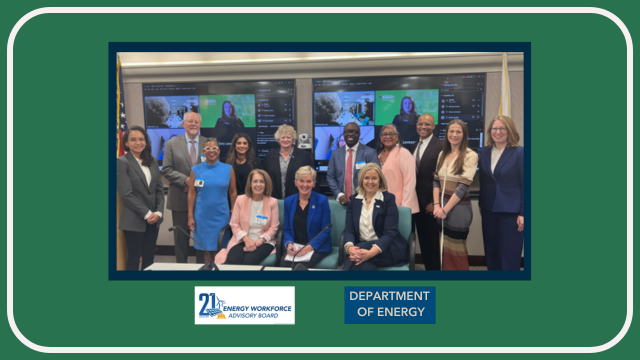Resource Roundup: What we are Reading – Issue 4, October 2024 – The Aspen Institute


The US economy continually evolves — and the nature of work along with it. Job quality advocates and researchers are meeting the moment, striving to better understand what workers are experiencing and putting forth proposals to ensure good jobs are prioritized.
This month’s Resource Roundup starts off with the 21st Century Energy Workforce Advisory Board’s first report, which offers a vision of how the US Department of Energy can help develop an inclusive, equitable clean energy workforce and advance job quality through its industrial strategy investments. Then, hear the perspective of young gig workers about how this new structuring of work has affected them in recently released research from The Workers Lab. Finally, organized labor continues to contend with falling unionization rates, despite broad support in polling. Former Department of Labor official Marty Manley offers his prescription for modernizing labor law and reinvigorating the labor movement in an essay for American Compass.
The Aspen Institute Economic Opportunities Program recently held the first of a two-part discussion series on prison labor and the challenges that individuals face finding work after release. Read about efforts underway in California and Nevada to abolish forced labor, and learn about the barriers that prevent people with credentials earned on the inside from securing employment on the outside.
The unprecedented federal investment in building a green economy has placed the Department of Energy (DOE) at the forefront for deploying hundreds of billions of dollars of funding in a manner that both increases economic competitiveness and supports good quality jobs in communities nationwide. Recently, DOE’s 21st Century Energy Workforce Advisory Board — which counts EOP Executive Director Maureen Conway among its members — released a report that lays out recommendations for ensuring that workforce development initiatives are data-driven, cohesive, directly connected to high-quality employment, and designed with equity in mind. Read the full recommendations here.
The Workers Lab | “We Are So Tired:” What Young Gig Workers Say About the Future of Work
Gig workers are among America’s most exploited, yet they are excluded from basic federal labor protections. To better understand the challenges faced by — and aspirations of — this workforce, The Workers Lab has engaged in a years-long participatory research project with affected workers, the Gig Workers Learning Project, in order that their voices shape recommendations for action.
This month, the Lab released new research, led by Shelly Steward — former director of EOP’s Future of Work Initiative and current chief research officer with The Workers Lab — on the experiences of young gig workers. Most work multiple jobs, often due to a high cost of living and low wages — and sometimes because of a need to arrange work around responsibilities like caretaking and school. In addition, experience requirements for entry-level positions lock out those in the gig workforce from traditional employment.
Hear more from gig workers about the conditions they face and their solutions for a better future in the full report.
American Compass | To Honor Labor, Rethink Unions
Federal labor law considers workplaces nonunion by default and requires that collective bargaining occur workplace-by-workplace. Writing for American Compass, former Assistant Secretary of Labor Marty Manley argues that this outdated framework — combined with a lack of competition in workers’ choice of union — has contributed to organized labor’s steady decline since the mid-20th century.
Wage boards offer a path forward, says Manley. These boards are common among peer countries, offering mechanisms for labor and management to negotiate pay standards. Providing for employee representation on company boards could help alleviate the information imbalance between workers and employers. And replacing the exclusive bargaining system with one that gives workers a greater choice of union could result in unions becoming more responsive to workers’ needs.
Read Manley’s full essay for more on the reforms he thinks are needed to usher in a new, stronger era for organized labor.
WorkRise | The Prison Credential Dilemma
The majority of those currently incarcerated will return into free society, yet, too often, credentials earned in incarceration do not translate into employment upon release.
Research by sociologist Sadé L. Lindsay found that the stigma of where credentials were received — i.e., prison — can lead some individuals to not include those credentials in job applications. Most research participants ended up unemployed or in unstable, low-paying jobs, despite the workforce training they had received. Effectively transitioning formerly incarcerated individuals back into the workforce requires pathways to be created between training programs on the inside and educational, reentry, and jobs-matching programs on the outside.
Learn more about the challenges facing those in reentry in a research summary published by the Urban Institute’s WorkRise initiative.
Associated Press | Voters in California and Nevada consider ban on forced labor aimed at protecting prisoners
Forced labor continues to be practiced in states nationwide. Incarcerated individuals were not included in the 13th Amendment’s abolition of slavery and involuntary servitude, and, as a result, many work long hours in dangerous conditions for little to no pay.
This year, ballot measures in California and Nevada are aiming to ban forced labor. If the measure is approved in California, a recently passed law establishing a voluntary work program will take effect, and incarcerated people will have the option to engage in rehabilitative programs, like education, according to proponents.
Read the Associated Press’ coverage for more on the impetus for the measure and its potential impact.

Student loans often follow borrowers for years, sometimes decades. Even people who fully understand how much they borrowed can feel...

It was a busy week for RIA aggregators. There were a few large moves, including $235 billion multi-family office Cresset...

Blog Posts Archives UnfavoriteFavorite February 27, 2026 Weave: The Social Fabric Project Subscribe to Weave’s Newsletter This story was originally...